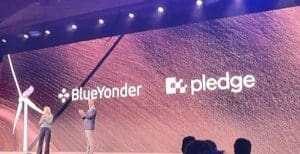Blue Yonder continues to demonstrate its commitment to sustainability with its latest acquisition of a UK-based Pledge Earth Technologies (Pledge).
 Announced at its ICON 2025 conference in Nashville, Chief Sustainability Officer Saskia Van Gendy joined CEO Angove on stage to share what this means for the organization and its customers. Pledge provides supply teams and logistics providers (LSPs) with accredited emissions measurement and reporting capabilities.
Announced at its ICON 2025 conference in Nashville, Chief Sustainability Officer Saskia Van Gendy joined CEO Angove on stage to share what this means for the organization and its customers. Pledge provides supply teams and logistics providers (LSPs) with accredited emissions measurement and reporting capabilities.
In alignment with its end-to-end supply chain strategy, Blue Yonder will now be able to assist its customers in automating the collection and exchange of shipment data from logistics suppliers, facilitating accredited and traceable emissions calculations across all transportation modes, including air, inland (truck, rail, barge), and sea. Blue Yonder customers can extend their applicable Blue Yonder solutions to include this new capability, which allows them to receive emissions reporting that conforms with the Global Logistics Emission Council (GLEC) framework, developed by the Smart Freight Center (SFC), and aligned with International Organization for Standardization (ISO) 14083: Greenhouse gases.
The acquisition of Pledge accelerates Blue Yonder’s sustainability roadmap by one year, enhances carbon management capabilities, and benefits customers.
Blue Yonder is confident that supply chain companies play a crucial role in carbon reduction and waste management. Integrating sustainability solutions within supply chain operations can provide major decarbonization results.

60% of global emissions originate from supply chains, and eight key industries account for 50% of these emissions, including food, fashion, construction, and freight. Currently, 80% of Fortune 500 companies are off track to meet net-zero emissions by 2050, and 25% of corporate profits are threatened by climate change risks. According to Bloomberg’s 2025 Climate Economy Outlook, the US spent $955 billion on climate-related impacts in 2024 alone, which is slightly over 3% of the country’s GDP.
There is increased pressure for effective environmental management due to:
- Complexity of emissions data
- Companies lack actionable data.
- Regulatory pressures
Currently, over 100 regulations are influencing how customers manage carbon pollution and waste. The rising costs of climate change, such as carbon pricing, could lead to an additional 50% in EBITDA costs. There is also an increased demand for transparency, societal and regulatory scrutiny of sourcing, and consumer demand, with consumers willing to change brand loyalty to shop sustainably. To address the growing consumer demand for improved environmental management and the constantly evolving regulatory landscape, Blue Yonder offers solutions through its Sustainable Supply Chain Management system.
With the acquisition of Pledge, Blue Yonder’s Sustainable Supply Chain Management now fully integrates Pledge’s capabilities and provides additional tools for its customers.

How Blue Yonder Integrates Sustainability Objectives into Supply Chain Objectives:
- Improved transportation emissions management
- Transportation emissions optimization
- Retail planning emissions measurement
- Manufacturing planning emissions measurement
| Objectives | Description |
| Trade-Off Analysis | Evaluate cost, lead times, transportation times, transportation mode impact on emissions, and business KPIs |
| Targeted Insights | Identify hotspots in materials and geographies for root cause analysis |
| Forecast | Predict emissions, optimize route planning, and select sustainable impact modes |
| Transparency | Evaluate multi-tier suppliers, track performance to optimize partnerships |
All emissions calculations are accredited with the Global Logistics Emissions Council (GLEC) and ISO 14083 standards. Calculations are automated and facilitate direct reporting from carriers for full visibility of planning emission impacts. Additionally, audit-compliant emissions can be collected from output intermodal freight and transshipment without granular shipment leg information.
















